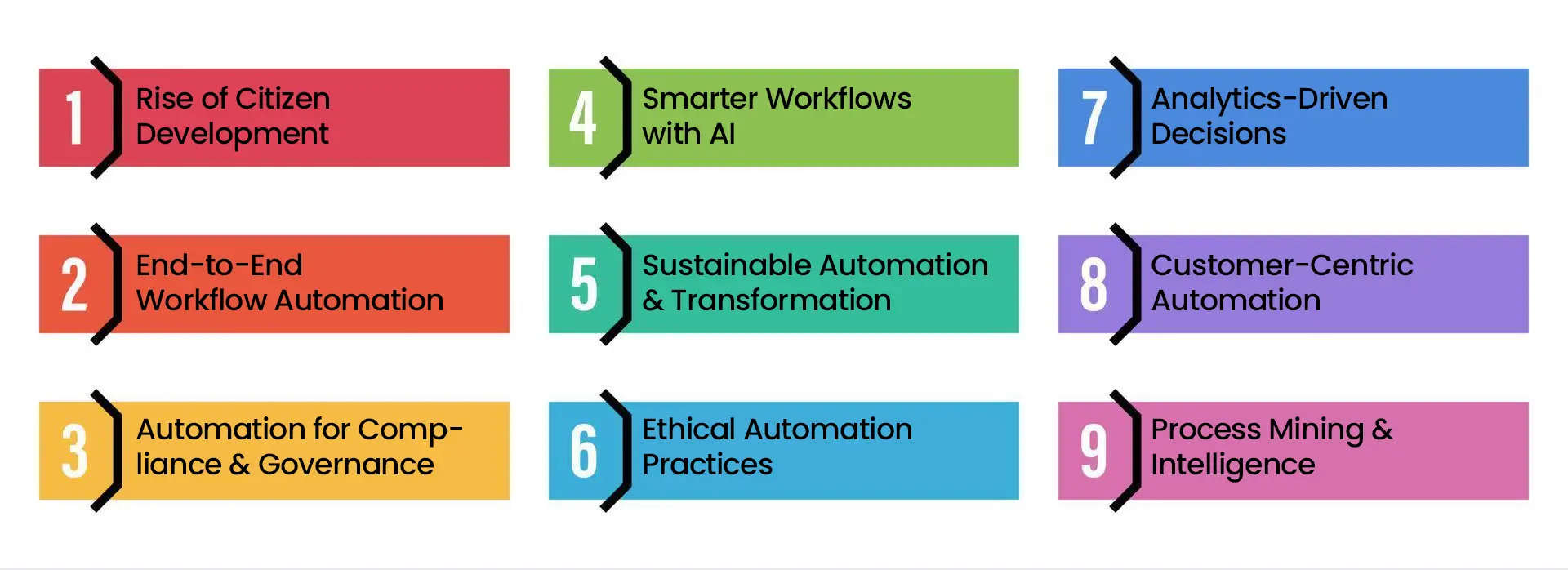The business process automation market is expected to grow from $9.8 billion in 2020 to $19.6 billion by the end of 2026, according to . MarketsandMarkets.
Being a part of this growing industry is probably your business endeavor, which is why you are here to learn about the top business process automation trends.
In this blog, we’ll discuss the top business process automation trends that are reshaping how modern teams work. The trends that are making operations more agile, smart, and aligned with customer and compliance needs.
Rise of Citizen Development
Citizen development is gaining popularity as organizations tend to see non-technical employees build applications and automate workflows using low-code or no-code platforms.
The approach permits non-technical users, such as operations management teams, to solve them independently, without calling IT resources every few hours. Consequently, organizations have started to address process gaps faster, reduce development backlogs, and create a mindset of innovation across teams.
Apparently, markets are suffering from a shortage of experienced developers and an increasing demand for faster digital solutions. Hence, businesses are turning to citizen development and using tools like Microsoft Power Apps, Zoho Creator, etc., to facilitate users in building and iterating workflows quickly.
Citizen development is not only reducing operational inefficiencies but also helping leaders scale automation across departments, giving them confidence for broader digital transformation initiatives.
Smarter Workflows with AI
Unsurprisingly, artificial intelligence is continuing to enhance the intelligence and adaptability of digital workflows. From NLP to ML models that predict outcomes, AI is streamlining process automation in ways previously unachievable.
As AI continues to embed in automation platforms, even non-technical users will be able to incorporate smart recommendations and instructions into their workflows. In short, here we’re talking about the impact of citizen developers and how they’ll learn to simplify processes, and how they are mapped and optimized.
For example, tools like Automation Anywhere and UiPath are already incorporating AI to help users discover new automation opportunities, validate process efficiency, and improve results.
Analytics-Driven Decisions
Real-time analytics and user-friendly dashboards are helping leaders monitor and optimize automated processes. Business leaders aren’t always tempted by “all the data” but by the “right data” and expect actionable insights at their fingertips without needing technical expertise in Power BI or Tableau.
These process automation platforms come with built-in analytics, allowing users to quickly assess process performance, track KPIs, and uncover bottlenecks.
Such self-service analytics within BPA platforms is driving the demand for data-driven decision-making. Through these tools, executives can visualize workflows and adjust them according to the insights at hand, helping them with faster iteration cycles and a clearer understanding of how processes impact long-term organizational goals.
End-to-End Workflow Automation
Workflow automation is no longer a luxury reserved for selected departments. It’s evolving into a company-wide penetration.
For example, low-code tools and robotic process automation (RPA) are speeding the digitalization of repetitive, manual processes across HR, finance, and operations teams. As more leaders experience the impact of automation, the broader adoption will only grow.
End-to-end workflow automation includes the complete sequence of tasks, from the initial input to the final output. Organizations such as logistics firms and field service providers are now using mobile-enabled workflows to digitize field operations, resulting in reduced paperwork, faster response times, and improved customer experience.
Sustainable Automation & Transformation
Business leaders inclined toward improving their business and environment focus on transformation initiatives that create eco-friendly and socially responsible changes. And process automation complements these efforts by automating ESG (environmental, social, governance) data collection, tracking, and reporting.
Besides improving data accuracy, automating these processes also helps organizations meet compliance and transparency requirements more effectively.
Moreover, various automation tools now include features that support sustainability reporting, such as real-time energy usage tracking, paperless documentation, and automated data audits.
Companies that embrace sustainable automation acquire a competitive edge by demonstrating environmental responsibility, contributing to a circular economy, promoting inclusive solutions, and streamlining ESG reporting workflows.
Customer-Centric Automation
Customer expectations are relentless, driving a focus on automating and optimizing front-facing business processes. From onboarding to customer service, process automation is empowering businesses to deliver faster, error-free, and hyper-personalized experiences.
By incorporating automation solutions into customer-facing functions, companies are validating customer data in real time, improving responsiveness, and ensuring consistent service delivery.
Consider the example of an insurance firm wanting to automate the claims processing system or streamline the loan approval process. The automation will lead to faster service, increased loyalty, and make it a more agile and customer-focused organization.
Handpicked content: Actionable AI: Transforming Business with Salesforce’s xGen-Sales and xLAM
Automation for Compliance & Governance
With data privacy regulations and compliance standards becoming more strict and watchful across industries, organizations are using business process automation solutions to automate governance and risk management processes.
For example, automated audit trails, documentation, and access controls ensure that processes adhere to industry regulations such as GDPR, HIPAA, and ISO standards.
Automation platforms embed compliance policies and instructions into workflows, serving as a blueprint for decision makers during compliance checks.
For regulated industries like healthcare, finance, etc., executives are employing automation to reduce human error risks and ensure readiness for audits. As compliance requirements and governances evolve, automation will remain a key enforcer of secure and consistent operations and protect organizations from data privacy violations.
Ethical Automation Practices
As automation technologies expand in scope and scale, the need for ethical frameworks are becoming proportionately important.
CEOs are expected to implement ethical automation strategies that are transparent, fair, and support their corporate values. This covers the impact of automation on job displacement, algorithmic bias for customer profiling, and data privacy.
Organizations that proactively establish ethical guidelines for automation and AI implementation alleviate reputational damage risks and also build trust with employees, customers, partners, and stakeholders.
Process Mining & Intelligence
Process mining is emerging as a new strategic workaround for companies wanting to closely look at how their functions operate. By analyzing system logs and workflow data, operations executives can use process mining tools to locate inefficiencies, compliance gaps, and opportunities for automation.
Suppose a retail store experiences recurring delays in order fulfillment due to manual invoice approvals. In such cases, the company can use process mining to identify inefficiencies, automate the approval process, and improve customer satisfaction.
Over time, the process intelligence and automation will work together to drive smarter, faster business decisions.
Which Business Process Automation Trends Are You Seeking?
Business automation trends have their own lifecycle, hence, business leaders, especially in dynamic mid-market segments cannot afford to waste time and lag behind.
The enterprise process automation trends indicate great promise for empowering leaders to become more agile, proactive, and data-driven.
If you want to find the right spots for business automation, you can also consult experienced technology partners to help you grow through business process automation strategies.






